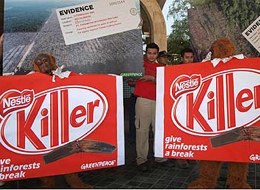Case 3
Nestle and Green peace – An Unlikely Duo

The History: In May 2010 Nestle announced a “zero deforestation” policy which will focus on amending its palm oil purchasing practices. The move follows a full blown Face book attack initiated by Greenpeace only weeks before.
Eight weeks prior, Greenpeace UK released a provocative YouTube video calling into question Nestle’s methods for acquiring palm oil. Greenpeace claims that the company’s practices contribute to rainforest deforestation and used YouTube as a platform to shock viewers with a video that likens eating a Kit Kat to eating an orangutan.
The video caught the attention of Nestle, who had it removed from YouTube and consequently incited Greenpeace to rally the troops to call, send e-mails and leave chastising comments on Nestle’s Facebook page. The situation created by the cacophony of Facebook and Twitter-based "twitstorm" worsened after a Nestle representative threatened to delete any comments by users whose profile pictures included an altered version of the Nestle logo.
What followed is quite remarkable from a social media standpoint, and has much to do with Nestle’s more aggressive plan to alter its palm oil practices. Within weeks of the opening salvo by Green peace - nearly 1.5 million views of the Kit Kat advert, over 200,000 e-mails sent, hundreds of phone calls and countless Face book comments, Nestle realized it needed to become positive and proactive.
Over the course of the start of the Green peace campaign to the time when Nestle effectively succumbed to the inevitable conclusion, Nestle’s share price dropped by nearly 20% - equivalent to $1.1B of market capitalization. On an interesting note, other organizations in the food retail industries saw what was happening to Nestle during this time and pro actively announced plans to amend their palm oil purchasing habits. These firms received positive Social Media reception and avoided some nasty issues of their own.
The Lesson: It is difficult to play hardball with Social Media storms. Nestle was unprepared for the initial onslaught – it was not monitoring for the buzz around its brand. Then by taking an aggressively dismissive tone, Nestle learned about the viral power of social media.
Nestle should have remembered that Customers criticizing you are telling you something very valuable – they are offering you a gift: You don't get to exist without customers, so listen to them. They are not your enemy. If they raise an issue, like they did with Nestle, you had better be aware of what they are saying and pay attention. You may disagree with them, but at a minimum they want to know you heard them.
Social Canary Value Proposition: Social Canary’s ongoing monitoring of social discussions, mentions and verbatim would have caught the upsurge in activity early on. Social Canary’s services would have provided alerts to Nestle of not only the increased Social Media activity but also of the topics being discussed. In addition, Social Canary would also have noted who the key influencers and drivers were.
Social Canary’s services would then have allowed Nestle to pro actively plan their responses and engage in a more coordinated fashion. Utilizing Social Canary’s skills could have helped Nestle avoid a serious social media meltdown and the associated negative press that comes from it.

 The customer has the power today - they need to be respected.
The customer has the power today - they need to be respected.